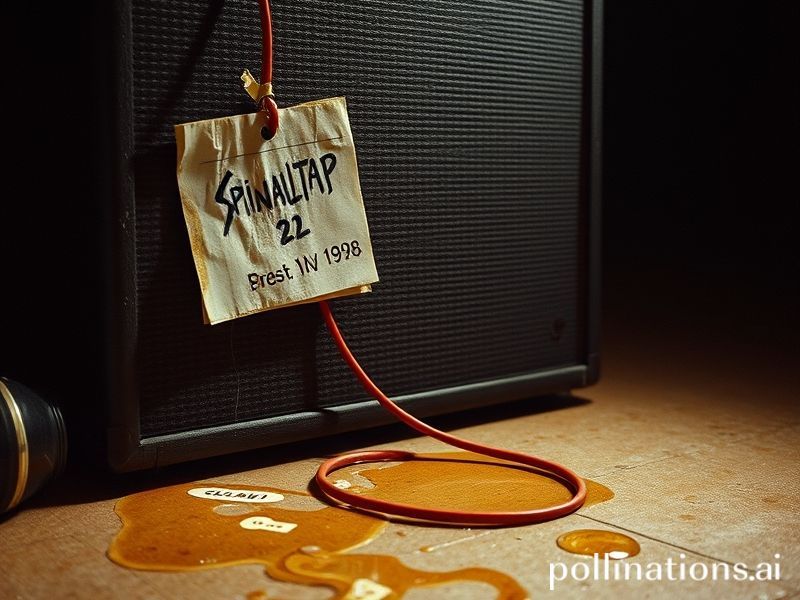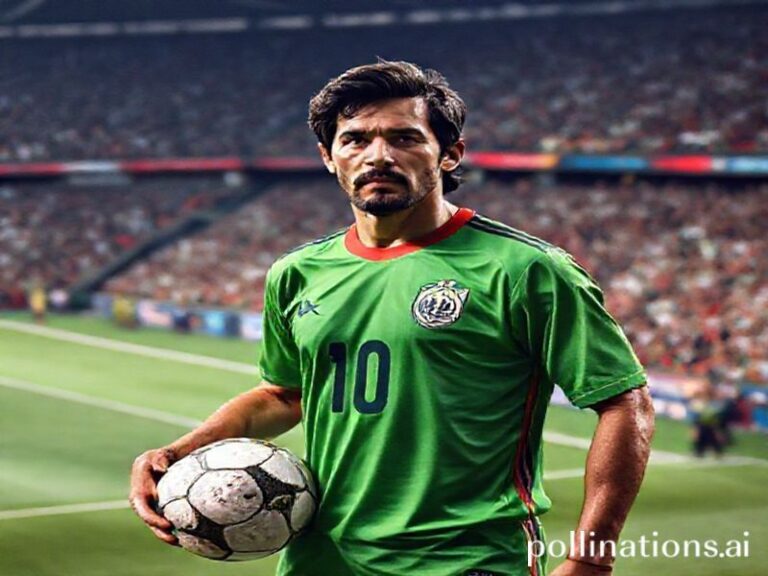World Dials Up to Eleven: Spinal Tap 2 Sends Geopolitics into Feedback Loop
When the first Spinal Tap documentary dropped in 1984, the Berlin Wall was still standing, CNN was barely four years old, and most of the planet still believed rock stars were demigods rather than tax exiles with tinnitus. Thirty-nine years later, the surviving members of England’s loudest semi-fictional band are reuniting for Spinal Tap 2—an event whose geopolitical ripple effects are already rattling the teacups from Reykjavík to Reykjavík Airport Duty Free.
Global markets, ever alert to absurdity arbitrage, reacted instantly: Fender’s stock hiccuped on rumors that Nigel Tufnel’s signature amp will now go to twelve; vinyl-pressing plants in the Czech Republic are reportedly retooling to meet a projected 400 % spike in demand for “none more black” gatefold sleeves; and the Swedish government has quietly convened an inter-agency task force to study whether sustained exposure to Stonehenge-themed power chords constitutes a form of soft-power aggression.
Meanwhile, the United Nations—an organization that still hasn’t figured out how to define “terrorism” to everyone’s satisfaction—has announced a special session on “Decibel Diplomacy,” presumably so delegates can argue over whether feedback squeals qualify as torture under the Geneva Conventions. Sources inside UNESCO hint that the film’s release may trigger a new category of Intangible Cultural Heritage: “Performative Self-Immolation by Aging Rockers.”
From a security standpoint, NATO planners are reportedly gaming scenarios in which Spinal Tap 2 becomes a vector for disinformation. Imagine a deep-faked Derek Smalls declaring war on Finland because he once got food poisoning in Helsinki, or a TikTok clip of David St. Hubbins endorsing cryptocurrency—both plausible enough to move markets and ruin brunches. The Pentagon, ever helpful, has already budgeted $2.7 million for a think-tank white paper titled “Suboptimal Amplification: Strategic Implications of Mockumentary Escalation in the Indo-Pacific.”
Developing nations, bless their optimism, see opportunity. Ghana just launched a pilot program teaching schoolchildren to play “Jazz Odyssey” on traditional xylophones, while Uruguay’s Ministry of Tourism is rebranding Montevideo as “The None-More-Tranquil Alternative to Cleveland.” Even North Korea’s state news agency issued a terse statement: “The DPRK will match decibel for decibel any imperialist mock-rock provocation,” which analysts interpret as either a threat or the first honest album review Kim Jong-un has ever given.
Of course, the real casualties are cultural. French critics—who once dismissed the original film as “un truc anglais”—are now penning 3,000-word essays on the metaphysics of the drummers’ spontaneous combustion, proving once again that existential dread sells better when wrapped in Marshall stacks. Japan has announced limited-edition capsule toys: tiny podiums that explode if you look at them too hard. And somewhere in a Brussels WeWork, EU regulators are drafting Directive 2024/AC/DC, setting maximum permissible irony levels in audiovisual content, complete with a 42-page annex on cucumber-shaped stage props.
All of this, naturally, obscures the film’s central tragedy: four men who still can’t tell the difference between artistic integrity and a catering rider. Their reunion is less a comeback than an international hostage situation in which the ransom note is simply the phrase “Hello, Cleveland,” repeated until we all surrender.
Conclusion: In a world where real wars drone on like an endless power-ballad intro, Spinal Tap 2 offers the consoling illusion that the loudest crises are still fictional. Yet the moment the first chord hits eleven, every embassy will scramble to decode the lyrics for hidden sanctions, every central bank will brace for a run on black T-shirts, and every citizen will remember that the line between parody and policy was erased somewhere between the Cold War and TikTok. If the original taught us that comedy is tragedy plus time, the sequel confirms the updated formula: tragedy plus time plus global supply chains. Rock on—if you dare.







